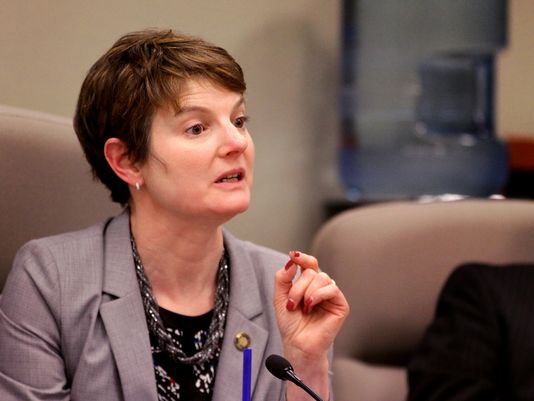StatesmanJournal.com
March 11, 2015
By Saerom Yoo
Oregon legislators are backing off a proposal that would have made it tougher for school children to opt out of vaccinations.
Instead, Sen. Elizabeth Steiner Hayward said Wednesday she will propose a different policy that would encourage more school children to get vaccinated but continue to allow nonmedical exemptions. It also would provide alternative paths for parents to comply with the law.
Senate Bill 442, which had one public hearing and attracted national attention, would have eliminated religious and philosophical exemptions from school shots. Only medical exemptions would have been allowed.
The new proposal, which has not yet been formally introduced, would allow parents to prove their child’s immunity from a vaccine-preventable disease and to use a vaccine catch-up schedule for those not in compliance with the state-mandated plan.
For example, the parent of a child who has natural immunity from the chicken pox could prove that through a blood test and not have to claim an exemption from the varicella vaccine.
Parents who do want to claim a nonmedical exemption would need to be educated on the risks of vaccine avoidance from their child’s primary care provider. The online video modules, produced by the Oregon Health Authority, would no longer be an option to satisfy the education requirement.
The policy would also require schools to make available their vaccine-exemption rates on their websites and report cards to prompt local public health conversations about vaccinations.
Steiner Hayward said this new idea addresses the main concerns of SB 442’s opponents, which were parental authority and informed consent. She said videos were not an effective tool for informed consent, which is why she wants to do away with them.
Oregon’s nonmedical exemption rate for kindergarteners is the nation’s highest, at 7 percent. It’s a number that has been steadily rising since 2000.
Waning support
Before the bill’s first public hearing, Steiner Hayward was confident it had the majority of votes in both the Senate and the House. However, on Wednesday, she said that support had weakened, necessitating an alternate course.
“Some of my colleagues changed their minds,” she said. “They got a lot of pressure one way or another. This is an issue that really mobilizes a very small minority of people, but it makes them very loud. I get that. That’s their right. But there were a bunch of people who weren’t prepared to take on this controversial of a topic at this point.”
While the bill had strong support from public health and medical leaders, including Oregon Health & Science University, Oregon Medical Association and Providence Health & Services, a vocal group of parents who either delay or avoid vaccines for their children has been active in opposing the bill.
While many are concerned about vaccine safety, some opposed the bill on grounds of medical freedom and parental autonomy.
At one point, discredited researcher Andrew Wakefield, whose retracted study first raised the hypothesis that the measles, mumps, rubella vaccine might be associated with autism, planned on testifying before the Senate health care committee. Robert F. Kennedy Jr., who wrote a book about a mercury-containing preservative in some vaccines and suggests that it is associated with autism, visited Salem last week to lobby Oregon lawmakers.
Both Wakefield’s and Kennedy’s claims are not supported by science, according to the U.S. Centers for Disease Control and Prevention.
The “No on Senate Bill 442” campaign also rallied Monday at the Capitol steps, attracting more than 150 people.
“We are thankful to Sen. Steiner Hayward and to her colleagues in the Senate for recognizing that this particular legislation was not the right course of action, and for protecting parental rights to make medical decisions for their children,” the campaign’s director, Bob Snee, said in a statement.
Meanwhile, a Portland blogger started an online campaign supporting SB 442 and gathered more than 1,400 signatures in one week.
Sen. Tim Knopp, R-Bend, who led the opposition at the Legislature against SB 442, said letting the bill die is the “right thing to do.”
He said while the debate was focused on Oregon’s nonmedical exemption rate, he wanted to distinguish that figure from the vaccination rate. He said because exemptions don’t necessarily mean children included in that statistic are completely unvaccinated, there doesn’t seem to be an emergency.
“Ultimately, we probably need to review whether or not Oregon needs a constitutional amendment to make sure parents are in control of their kids’ health care,” Knopp said.
Science vs. opinion
Portland pediatrician and Children’s Health Alliance’s medical director Dr. Jay Rosenbloom said while he was disappointed by how the debate around the legislation unfolded in Oregon, it wasn’t atypical.
The vocal minority is loud and organized, while the majority tends to stay silent, he said. Legislators should remain focused on public health and vote based on sound science, he said.
“Mississippi and West Virginia have proved to us that legislation like this can work,” Rosenbloom said. Mississippi and West Virginia are the only two states that don’t allow nonmedical exemptions, and Mississippi has the country’s highest vaccination rate, at near 100 percent. “This wasn’t groundbreaking legislation. The problem lies in convincing legislators of what the science says about the safety of vaccines, rather than having this be a debate amongst constituents.
“Scientific facts are not established based on a popular vote. This is not an opinion vote.”
Sen. Jeff Kruse, R-Roseburg, on Friday published a newsletter saying he believed vaccines are linked to autism and accusing the CDC of mismanagement and corruption, both of which are points made in the documentary Kennedy showed to lawmakers last week.
“Maybe we should make these lawmakers go through the same educational videos that parents have to before deciding against vaccinating their children,” Rosenbloom said. “What education do they have to have before they decide to vote against this?”
Jen Phillips, a University of Oregon neuroscientist and mother of two children who are fully vaccinated, said she lives near a school in Eugene with a high vaccine-exemption rate, and she worries that her neighborhood would not be protected from an outbreak if a case of vaccine-preventable disease occurred.
“I’m so disappointed that it seems like there’s nothing short of a serious outbreak that’s going to change people’s minds on this,” Phillips said. “I wish people could be more broad-minded about avoiding this catastrophe before it happens.”
She said this might be a wake-up call for parents who are pro-vaccine to get better organized. But parents are hesitant about getting involved in a debate that can quickly turn acrimonious and personal, she said.
“Honestly, the fact that every medical organization in Oregon sent support and endorsed the bill and it still wasn’t enough is pretty telling,” Phillips said. “I don’t think that it should be a popularity contest. I don’t think public heath should be politicized.”
The real majority
Steiner Hayward said the vast majority of Oregonians supported SB 442. A 7 percent nonmedical exemption rate means that 93 percent of parents are fully immunizing their children, she points out.
“Even legislators who are not ready to vote on it agree that it’s true,” she said.
Nonetheless, Steiner Hayward said, she wants to focus on what can practically be accomplished. There are other important tasks to get done, she said.
“I like to claim — and I hope I’m correct — that I try to blend idealism with pragmatism as a legislator and I always believed that half a loaf is better than none,” she said. “It was clear we weren’t going to get what we wanted. We just didn’t have what was necessary for a constitutional majority.”
If her Plan B doesn’t improve vaccination rates in Oregon, Steiner Hayward said, she’s prepared to return in a future legislative session to try again.

